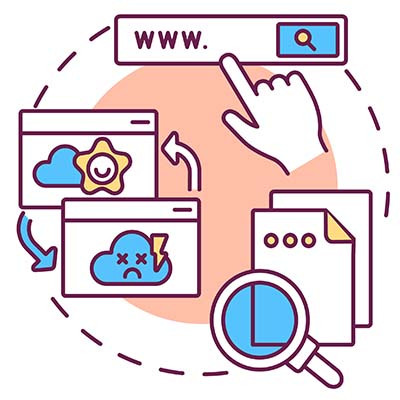Ferrum Technology Services Blog
The Internet of Things (IoT) is becoming one of the most exciting tech trends out there, but it is difficult to know where to start. It means using Internet-connected smart devices to help businesses run better. Some companies think IoT is too expensive or too complicated, but when done right, it can actually save a lot of money and make things work smoother. Let’s break down how businesses are using IoT and why it’s totally worth it.
The Internet of Things (IoT) is one of the most intriguing technologies businesses can use. When brought into the fold, it has changed how offices function, bringing a range of benefits that enhance efficiency, productivity, and security. IoT devices and systems can streamline processes and create a more comfortable, productive, and sustainable work environment. This month, we discuss how small businesses can use IoT to improve their operations.
The Internet has become an indispensable part of our lives. Those who have been online since the mid-90s have witnessed a dramatic transformation in how we use it. Today's lightning-fast, always-on connectivity has replaced yesteryear's slow, dial-up connections. Let's explore how Internet speeds have evolved over the past three decades.
Individuals and businesses are increasingly relying on wireless technologies to maintain constant connectivity because users rely on wireless networks. In recent years, numerous innovations have occurred in this space, and we thought that in this month's newsletter, we’d highlight some of the key innovations in the wireless domain that you should be aware of.
Billions of people who find themselves on the Internet depend on the use of Google Search to find what they are looking for. What actually happens when you click on the “search,” though? Today, we want to discuss how the search engine works so you can get a better idea of what goes on behind the scenes.
Protecting personal data has become a critical concern as more and more people use Internet-connected accounts. While this tech has undoubtedly enriched our lives, it has also paved the way for unprecedented invasions of privacy, particularly by enormous technology companies that claim to be doing it for their own good. Today, we will explore how these giants compromise data privacy, raising questions about the balance between innovation and safeguarding our most sensitive information.
Communications are often the unsung hero in business operations, enabling all others to some degree. As a result, investing in the right tools can very much give your business a boost—and nowadays, the right tool for your communication needs is something called Voice over Internet Protocol, or VoIP, telephony.
Let’s go over what VoIP is, and why it’s the better option for your business.
On September 15, 1997, Google registered its domain and began its climb to the top of the search engine ladder. It began as a simple search engine, but since then it has seen immense growth as it continues to develop platforms and services through its parent company, Alphabet. There is a certain nostalgia attached to Google Search, and the company regularly includes little tidbits with the feature that people find fun: Easter Eggs.
What measures do you take to protect your employees and business from the dangers found on the Internet? One major company, Google, is implementing some extreme measures to protect against online threats. In this pilot program, the Internet is simply not available to its workers. How is Google—a company notorious for its search engine and web-related technology—making do with minimal access to the Internet? The answer might surprise you.
Keeping your business’ Internet connections secure is paramount in the quest to maintain cybersecurity. There really isn’t any other option. Fortunately, protecting your business’ wireless connections isn’t that difficult. This month, we will go through a few steps that you can take to help keep your Wi-Fi connection secure.
Your business’ bandwidth could reference a couple of different parts of your IT infrastructure, with the most notable being your network bandwidth and your Internet bandwidth. Today, we want to focus on demystifying your network bandwidth by answering all of the frequently asked questions you might have on the topic.
If you spend any amount of time on YouTube, chances are you’ve seen videos bring up the names of various sponsors, including consumer VPNs. VPN providers take advantage of the trendiness of these influencers to spread awareness of their products. We want to make one thing abundantly clear: the consumer VPNs offered by these sponsors are not the kind of VPN your business should be using.
Quick response codes, or QR codes, are all over the place in today’s business world. They have largely been implemented as a means of providing contactless services throughout the pandemic and post-pandemic business environment, but they have also long been used for things like menus, document access and management, and so on. Even cybercriminals are using QR codes to their advantage, making it harder for all of us to trust them.
Remember Google+? It was Google’s attempt at making a social media platform, and while it ultimately was not successful, it did have some interesting features that eventually made their way to other parts of Google’s growing list of business and enterprise services. Now, Google+’s legacy is in its final moments, as Google plans to shut down the Currents service this upcoming July.
With the Internet cementing itself as one of the best tools to get work done, it’s easy to forget just how sluggish it used to be back when it first became available for use. Internet speeds have undergone some dramatic shifts over the years, so let’s remember the good old days when it took ages to do just about anything with it.
It’s all well and good for us to recommend that you avoid phishing attacks and infected attachments simply by not clicking on the links in emails and other popular vectors of attacks, but the fact of the matter is that you might need to click on one at some point. In this case, it’s best to check the link before clicking it, and we’re here to offer tools to help you do so.
You probably use Google more often than you think, but there are, of course, other search engines out there that perform similar functions. Why, then, is Google by far the most popular one? We’ll discuss some of the pros and cons of the various other search engines, but let’s start with Google itself.




















